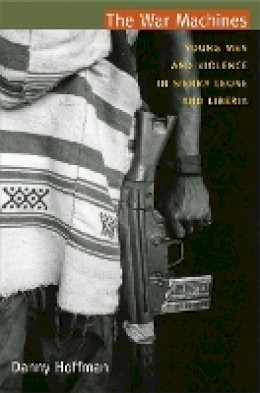“Hoffman’s book is at once a tightly-wound first person account of life amongst Sierra Leone’s ‘lumpen proletariat’ and an impressive work of economic and cultural theory. It is this unusual lens that makes The War Machines so thought-provoking, even for those intimately familiar with the Mano River War, and Hoffman provides enough background and context that it is still a...
Read more“Hoffman’s book is at once a tightly-wound first person account of life amongst Sierra Leone’s ‘lumpen proletariat’ and an impressive work of economic and cultural theory. It is this unusual lens that makes The War Machines so thought-provoking, even for those intimately familiar with the Mano River War, and Hoffman provides enough background and context that it is still a powerful read for the uninitiated. “ - D. Tsomondo, cool’eh “This is an exceptional read for an audience well-beyond war and conflict interested anthropologists. Hoffman has an apt eye, is analytically sass and writes in straightforward prose. The book is richly illustrated with Hoffman’s excellent photos.” - Mats Utas, Anthropological Quarterly “Hoffman avoids the common language of chaos and failed states, noting that though it is hard to idealize militia life, in this context it may be seen as asocial movement prepared to defend itself against external predations. Highly recommended.” - O. Pi-Sunyer, Choice “This is a novel departure from most previous studies of youth and violence in Africa, and as such it is a necessary and provocative addition to the literature.… [A] wealth of material he brings to bear on our understanding of youth violence.” - Catherine Bolten, Anthropos “It is to Hoffman’s great credit as a scholar and author that his writing… is equally compelling, deftly articulating political philosophical concepts (no small feat with the repertoire he has selected) and evocatively rendering dynamic social environments…. Hoffman succeeds in making the political, economic and social connections he sets out to make. The War Machines provides a welcome addition to the modest Mano River canon, and a valuable entry point for academic visitors in and voyageurs out.” - Zoe Marks, The Journal of Modern African Studies “[A] path-breaking ethnography that offers a completely novel analytical framework for the anthropology of war in general, and for the interconnected wars in the West African Mano River Basin region in particular.” - Sverker Finnström, African Studies Quarterly “The ethnographic narrative, as well as the crafted images throughout the text, conveys a rich and nuanced portrayal of the lives of Hoffman’s subjects and their context, which avoids at all times violence aestheticizing or full denial of individual’s agency…. This book is a must read for any serious scholar interested in the study of globalisation, post-colonialism, or visual research methodology.” - Yolanda C. Martin, Visual Studies “It’s clear from the onset that the questions pursued are quite original and nontraditional for an anthropological reading of young West African combatants….widely accessable to those without a specific interest in an anthropological study of Africa.” - Sammy Badran, Theory & Event “[A] path-breaking ethnography that offers a completely novel analytical framework for the anthropology of war in general, and for the interconnected wars in the West African Mano River Basin region in particular.”
Sverker Finnström
African Studies Quarterly
“Hoffman avoids the common language of chaos and failed states, noting that though it is hard to idealize militia life, in this context it may be seen as asocial movement prepared to defend itself against external predations. Highly recommended.”
O. Pi-Sunyer
Choice
“It is to Hoffman’s great credit as a scholar and author that his writing… is equally compelling, deftly articulating political philosophical concepts (no small feat with the repertoire he has selected) and evocatively rendering dynamic social environments…. Hoffman succeeds in making the political, economic and social connections he sets out to make. The War Machines provides a welcome addition to the modest Mano River canon, and a valuable entry point for academic visitors in and voyageurs out.”
Zoe Marks
Journal of Modern African Studies
“It’s clear from the onset that the questions pursued are quite original and nontraditional for an anthropological reading of young West African combatants….widely accessable to those without a specific interest in an anthropological study of Africa.”
Sammy Badran
Theory & Event
“The ethnographic narrative, as well as the crafted images throughout the text, conveys a rich and nuanced portrayal of the lives of Hoffman’s subjects and their context, which avoids at all times violence aestheticizing or full denial of individual’s agency…. This book is a must read for any serious scholar interested in the study of globalisation, post-colonialism, or visual research methodology.”
Yolanda C. Martin
Visual Studies
“This is a novel departure from most previous studies of youth and violence in Africa, and as such it is a necessary and provocative addition to the literature.… [A] wealth of material he brings to bear on our understanding of youth violence.”
Catherine Bolten
Anthropos
“This is an exceptional read for an audience well-beyond war and conflict interested anthropologists. Hoffman has an apt eye, is analytically sass and writes in straightforward prose. The book is richly illustrated with Hoffman’s excellent photos.”
Mats Utas
Anthropological Quarterly
Read less
